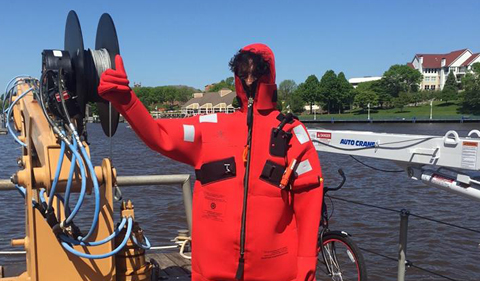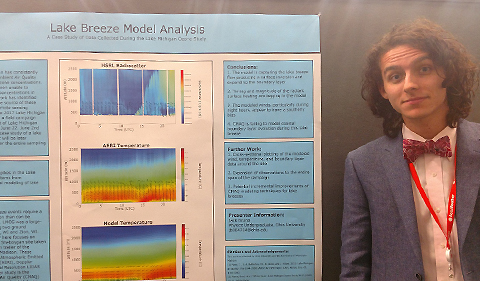
Jack Bruno participates in a day-long safety training session wearing a “dry suit” as he poses on the deck of a NOAA research vessel.
Ohio University Honors Tutorial College physics major Jack Bruno spent the summer as an intern based in the coastal city of Sheboygan, Wis., where he was a member of a scientific team studying the drift of pollution over Lake Michigan. Research since the early 1990s has shown the area has had problematically high surface ozone concentrations.
Bruno was one of 26 students last year to receive an OHIO Student Enhancement Award. The program offers awards up to $6,000 per applicant to support undergraduate, graduate and medical student research, scholarship and creative activity.
“I‘m interested in learning more about pollution, how it contributes to climate change, and how the two intersect with public policy,” Bruno says. “We have to better understand what is taking place locally to understand what is taking place on a broader scale. If pollutants are drifting between states, for example, we may have to revise environmental policy which is currently enforced on a state by state basis.”
The internship came about after Bruno contacted a climate scientist at Harvard University who referred him to Research Scientist Jonathan Gero of the Space Science and Engineering Center at the University of Wisconsin-Madison. Bruno expressed interest in summer undergraduate research specifically focused on climate science instrumentation. Gero sent a list of several possible projects. Bruno chose to join Gero’s UW team deploying the SPARC mobile research laboratory to take remote sensing data of the boundary layer in Sheboygan. The project is part of wide sweeping field campaign taking place along the Lake Michigan coast.
SPARC, an acronym for The Space (Science and Engineering Center) Portable Atmospheric Research Center, is based at UW. It is a specially designed vehicle outfitted with instruments that make ground-based measurements used for studying the atmosphere, most notably the AERI instrument. AERI, or Atmospheric Emitted Radiance Interferometer, is a ground-based instrument that measures the downward infrared radiance from the Earth’s atmosphere. AERI uses spectroscopy to take vertical temperature and humidity profiles of sections of the atmosphere.
The purpose of the field campaign is to better understand lower atmospheric circulation over Lake Michigan. Scientists track the movement of surface ozone and ozone precursor chemicals over the same region. Ozone precursor chemicals are compounds such as carbon monoxide, methane, or nitrogen oxide, that when in the presence of solar radiation react with other chemicals to form ozone.
“Ozone pollution can adversely affect agricultural growth,” Bruno explains. “High surface ozone levels are a danger to human health and breathing. This summer we studied drift of pollution over Lake Michigan, whose breezes move ozone and chemicals from urban centers to rural areas. Sources of pollution can be from cars, energy production in urban centers like power plants, and heating and cooling systems in buildings.”
Bruno continues to work with UW on data analysis from the campaign and presented results of a summer lake breeze event at the 2018 American Meteorological Society Student Conference in Austin, Texas. He plans to write his undergraduate honors thesis using data from the campaign related to improvement of “Lake Breeze” modeling.

Bruno presented research at the 2018 American Meteorological Society Student Conference held in Austin, Texas.
Eventually Bruno intends to broaden the scope of his climate studies to a global scale. He wants to discover ways to mitigate the negative effects of pollution generated by the United States on other countries, especially in the developing world.
“As early as I can remember, my parents instilled in me the importance of climate change as a global issue,” explains Bruno. “My mother was adamant about being scientifically literate in all subjects to some extent. I’ve come to believe that climate change is the single highest scientific hurdle to overcome.”
Student Enhancement Awards are funded by the Office of the Vice President for Research and Creative Activity and administered by the Council for Research, Scholarship and Creative Activity, which is appointed by Faculty Senate.



















Comments